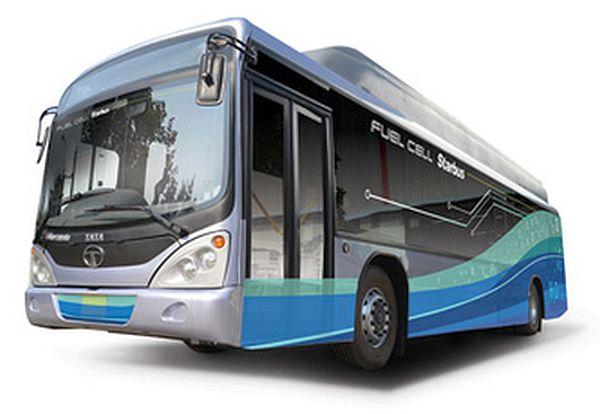News
Tata Motors joins hands with ISRO for hydrogen powered bus
India's leading commercial vehicle maker and the world's 4th largest bus maker, Tata Motors, has teamed up with ISRO (Indian Space Research Organization) to come up with a hydrogen powered bus. This hydrogen powered bus was demonstrated recently at ISRO's Liquid Propulsion Systems Center (LPSC) in Mahendragiri, Tamil Nadu.
Note: Tata Motors's Hydrogen Fuel Cell powered Starbus concept used as an illustration.
The bus that was demonstrated at LPSC uses hydrogen stored in compressed liquid form, in bottles at the top of the bus. The liquid hydrogen powers the fuel cells to generate electricity, that in turn drives the electric motor. ISRO's involvement in this project entails the leveraging of the organization's hydrogen fuel handling capabilities into commercial applications such as buses.
Notably, this isn't the first instance of Tata Motors using hydrogen to power a bus. At last year's Indian Auto Expo, the utility vehicle major showcased a hydrogen fuel cell powered Starbus concept. The demonstration of the hydrogen powered bus at ISRO's LPSC represents the culmination of the project that Tata Motors and ISRO entered into, in 2006.
The idea behind this project was to develop hydrogen fuel cell technology that could be safely and viably used in commercial applications. In the future, city buses in India could use hydrogen produced as by-products at refineries and fertilizer plants to power their fuel cells. Hydrogen can be used to power an automobile in two ways; 1: To power an internal combustion engine. 2: To power a fuel cell.
A hydrogen powered internal combustion engine produces more power than an equivalent petrol powered engine. However, hydrogen powered internal combustion engines do produce nitrous oxide tail pipe emissions. On the other hand, hydrogen fuel cell powered vehicles emit water as the by-product of combustion, thus emitting no gases into the atmosphere.
This makes hydrogen fuel cell powered automobiles a greener option than the hydrogen powered automobiles with internal combustion engines. However, one advantage of using hydrogen in internal combustion engines is that the engines can be converted to run on hydrogen at a price that is much lower than what a fuel cell costs.

















